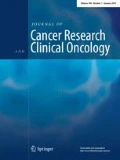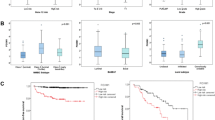Abstract
Purpose
The polycomb group protein Enhancer of Zeste Homolg 2 (EZH2), a repressor of gene transcription, has been linked to the progression of various malignancies. This study was done to examine a potential correlation of EZH2 mRNA expression with clinicopathological parameters and outcome in patients with urothelial carcinoma (UC) of the bladder.
Methods
We determined the relative EZH2 gene expression by quantitative RT-PCR in tumor specimens from a cohort of 100 patients with UC (mean follow-up 44.2 months). EZH2 expression levels were correlated to pathological tumor features and outcome.
Results
Enhancer of Zeste Homolg 2 was expressed in 90% of the tumor samples. Expression levels increased in parallel with tumor stage (P = 0.002). High grade UC displayed significantly elevated EZH2 levels compared to low grade disease (P < 0.0001). High EZH2 expression was related to an abbreviated time to recurrence in muscle invasive carcinomas (pT ≥ 2) (P = 0.028). No such correlation was detected in the group of superficial tumors (pT ≤ 1) (P = 0.191). High EZH2 expression levels were associated with an increased risk of tumor related death in the univariate analysis (relative risk, 3.1; P = 0.029). This association became non-significant when the prognostic effect of tumor stage was considered in a multivariate model.
Conclusions
Enhancer of Zeste Homolg 2 expression is related to an aggressive tumor behavior but due to its strong association with pathological features, EZH2 levels do not provide independent prognostic information.




Similar content being viewed by others
References
Arisan S, Buyuktuncer ED, Palavan-Unsal N, Caskurlu T, Cakir OO, Ergenekon E (2005) Increased expression of EZH2, a polycomb group protein, in bladder carcinoma. Urol Int 75:252–257
Bachmann IM, Halvorsen OJ, Collett K, Stefansson IM, Straume O, Haukaas SA, Salvesen HB, Otte AP, Akslen LA (2006) EZH2 expression is associated with high proliferation rate and aggressive tumor subgroups in cutaneous melanoma and cancers of the endometrium, prostate, and breast. J Clin Oncol 24:268–273
Bracken AP, Pasini D, Capra M, Prosperini E, Colli E, Helin K (2003) EZH2 is downstream of the pRB-E2F pathway, essential for proliferation and amplified in cancer. EMBO J 22:5323–5335
Cote RJ, Datar RH (2003) Therapeutic approaches to bladder cancer: identifying targets and mechanisms. Crit Rev Oncol Hematol 46 (Suppl):S67–S83
Ding L, Erdmann C, Chinnaiyan AM, Merajver SD, Kleer CG (2006) Identification of EZH2 as a molecular marker for a precancerous state in morphologically normal breast tissues. Cancer Res 66:4095–4099
Eble JN, Sauter G, Epstein JI, Sesterhenn IA (2004) Pathology and genetics of tumors of the urinary system and male genital organs. IARC press, Lyon
Epstein JI, Amin MB, Reuter VR, Mostofi FK (1998) The World Health Organization/International Society of Urological Pathology consensus classification of urothelial (transitional cell) neoplasms of the urinary bladder. Bladder Consensus Conference Committee. Am J Surg Pathol 22:1435–1448
Esteller M (2006) Epigenetics provides a new generation of oncogenes and tumour-suppressor genes. Br J Cancer 94:179–183
Feber A, Clark J, Goodwin G, Dodson AR, Smith PH, Fletcher A, Edwards S, Flohr P, Falconer A, Roe T, Kovacs G, Dennis N, Fisher C, Wooster R, Huddart R, Foster CS, Cooper CS (2004) Amplification and overexpression of E2F3 in human bladder cancer. Oncogene 23:1627–1630
Gunster MJ, Raaphorst FM, Hamer KM, den Blaauwen JL, Fieret E, Meijer CJ, Otte AP (2001) Differential expression of human Polycomb group proteins in various tissues and cell types. J Cell Biochem Suppl (Suppl 36):129–143
Hanahan D, Weinberg RA (2000) The hallmarks of cancer. Cell 100:57–70
Karge WH III, Schaefer EJ, Ordovas JM (1998) Quantification of mRNA by polymerase chain reaction (PCR) using an internal standard and a nonradioactive detection method. Methods Mol Biol 110:43–61
Kleer CG, Cao Q, Varambally S, Shen R, Ota I, Tomlins SA, Ghosh D, Sewalt RG, Otte AP, Hayes DF, Sabel MS, Livant D, Weiss SJ, Rubin MA, Chinnaiyan AM (2003) EZH2 is a marker of aggressive breast cancer and promotes neoplastic transformation of breast epithelial cells. Proc Natl Acad Sci USA 100:11606–11611
Matsukawa Y, Semba S, Kato H, Ito A, Yanagihara K, Yokozaki H (2006) Expression of the enhancer of zeste homolog 2 is correlated with poor prognosis in human gastric cancer. Cancer Sci 97:484–491
Olsson AY, Feber A, Edwards S, Te PR, Giddings I, Merson S, Cooper CS (2006) Role of E2F3 expression in modulating cellular proliferation rate in human bladder and prostate cancer cells. Oncogene 26(7):1028–1037
Raman JD, Mongan NP, Tickoo SK, Boorjian SA, Scherr DS, Gudas LJ (2005) Increased expression of the polycomb group gene, EZH2, in transitional cell carcinoma of the bladder. Clin Cancer Res 11:8570–8576
Schulz WA (2006) Understanding urothelial carcinoma through cancer pathways. Int J Cancer 119:1513–1518
Slaton JW, Benedict WF, Dinney CP (2001) P53 in bladder cancer: mechanism of action, prognostic value, and target for therapy. Urology 57:852–859
Sobin LH WC (2002) TNM classification of malignant tumors, 6th edn. Springer, Berlin
Tiguert R, Fradet Y (2002) New diagnostic and prognostic tools in bladder cancer. Curr Opin Urol 12:239–243
Varambally S, Dhanasekaran SM, Zhou M, Barrette TR, Kumar-Sinha C, Sanda MG, Ghosh D, Pienta KJ, Sewalt RG, Otte AP, Rubin MA, Chinnaiyan AM (2002) The polycomb group protein EZH2 is involved in progression of prostate cancer. Nature 419:624–629
Vire E, Brenner C, Deplus R, Blanchon L, Fraga M, Didelot C, Morey L, Van Eynde A, Bernard D, Vanderwinden JM, Bollen M, Esteller M, Di Croce L, de Launoit Y, Fuks F (2006) The Polycomb group protein EZH2 directly controls DNA methylation. Nature 439:871–874
Weikert S, Christoph F, Kollermann J, Muller M, Schrader M, Miller K, Krause H (2005) Expression levels of the EZH2 polycomb transcriptional repressor correlate with aggressiveness and invasive potential of bladder carcinomas. Int J Mol Med 16:349–353
Zeidler M, Varambally S, Cao Q, Chinnaiyan AM, Ferguson DO, Merajver SD, Kleer CG (2005) The Polycomb group protein EZH2 impairs DNA repair in breast epithelial cells. Neoplasia 7:1011–1019
Acknowledgments
The authors wish to thank Ms. Petra von Kwiatkowski, Ms. Waltraud Jekabsons and Ms. Antonia Maas from the department of Urology for their excellent support in assessing the samples.
Author information
Authors and Affiliations
Corresponding author
Rights and permissions
About this article
Cite this article
Hinz, S., Kempkensteffen, C., Christoph, F. et al. Expression of the polycomb group protein EZH2 and its relation to outcome in patients with urothelial carcinoma of the bladder. J Cancer Res Clin Oncol 134, 331–336 (2008). https://doi.org/10.1007/s00432-007-0288-8
Received:
Accepted:
Published:
Issue Date:
DOI: https://doi.org/10.1007/s00432-007-0288-8




